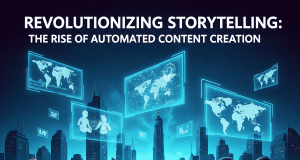In today’s fast-paced digital landscape, businesses are constantly seeking innovative ways to engage consumers and stand out from the competition. One of the most transformative technologies influencing marketing strategies is generative artificial intelligence (AI). This powerful tool can not only streamline processes but also enhance creative capabilities, allowing brands to develop meaningful campaigns that resonate with their target audiences.
Understanding Generative AI
Generative AI refers to algorithms capable of creating content—be it text, images, music, or even code—by leveraging patterns in existing datasets. Unlike traditional AI, which analyzes data to make predictions, generative AI actively generates new outputs based on learned inputs. This technology enables marketers to brainstorm fresh ideas, optimize campaigns, and personalize content at scale.
The Concept Phase: Ideation and Brainstorming
Generating ideas is often the most challenging step in the marketing process. Here, generative AI can play a pivotal role. Tools powered by AI can analyze market trends, consumer behaviors, and previous campaign performances to curate insights that inspire innovative concepts.
1. Market Analysis
Generative AI can process vast amounts of data from multiple sources, identifying emerging trends and consumer sentiments. By synthesizing this information, marketing teams can pinpoint opportunities for new campaigns that align with audience expectations.
2. Creative Brainstorming
AI-driven platforms can facilitate brainstorming sessions by generating multiple ideas based on specific prompts. By providing various angles of approach, brands can explore concepts they may not have considered manually.
Campaign Development: Content Creation and Optimization
Once concepts are in place, the next stage is campaign development. Generative AI enhances this process by automating content creation and optimizing marketing assets.
1. Content Creation
From social media posts and email newsletters to blog articles and how-to guides, generative AI can produce text that is engaging and contextually relevant. This reduces the time marketers spend on copywriting, allowing them to focus on strategic tasks.
2. Visual Design
In addition to text, generative AI can create stunning visuals, from graphics to video content. By generating images tailored to specific themes or audiences, brands can maintain visual consistency across multiple channels while saving on design costs.
3. Personalization at Scale
Consumers increasingly expect personalized experiences. Generative AI can help create customized content for different segments, analyzing user data to tailor messages, recommendations, and even product descriptions. This personalized touch enhances consumer engagement and fosters brand loyalty.
Campaign Execution: Optimization and Real-Time Adjustments
Once a campaign is launched, monitoring its performance is critical. Generative AI gears marketers with insights that facilitate rapid adjustments.
1. Real-Time Analytics
AI can track key performance indicators (KPIs) in real time, analyzing what works and what doesn’t. This capability allows marketers to adapt strategies quickly, shifting resources to high-performing campaigns or content.
2. A/B Testing
Generative AI can streamline the A/B testing process by generating multiple variations of ads, landing pages, and promotional emails. By efficiently testing different versions, brands can optimize their marketing efforts based on consumer responses.
The Future of Marketing with Generative AI
As generative AI continues to evolve, its impact on marketing strategies will only grow deeper. Brands that fully embrace this technology can expect enhanced creativity, efficiency, and ultimately, stronger customer relationships.
1. Innovative Collaborations
The future may see deeper collaborations between human marketers and AI, where AI serves not just as a tool, but as a creative partner, offering suggestions, generating drafts, and continuously learning from feedback.
2. Ethics and Transparency
The use of generative AI also brings forth ethical considerations. Marketers will need to prioritize transparency regarding AI-generated content and ensure they maintain a human touch to avoid alienating consumers.
3. Skill Development
To harness the full potential of generative AI, marketing teams will need to cultivate new skills. This includes understanding AI technology, interpreting data, and developing a keen sensitivity to consumer needs.
Conclusion
Generative AI is revolutionizing the marketing landscape by enabling brands to innovate from concept to campaign. By leveraging this technology, marketers can create compelling, personalized, and efficient campaigns that captivate audiences and drive business growth. As the industry continues to evolve, those who embrace generative AI will not only keep pace but may even lead the charge into a new era of marketing creativity and effectiveness.









